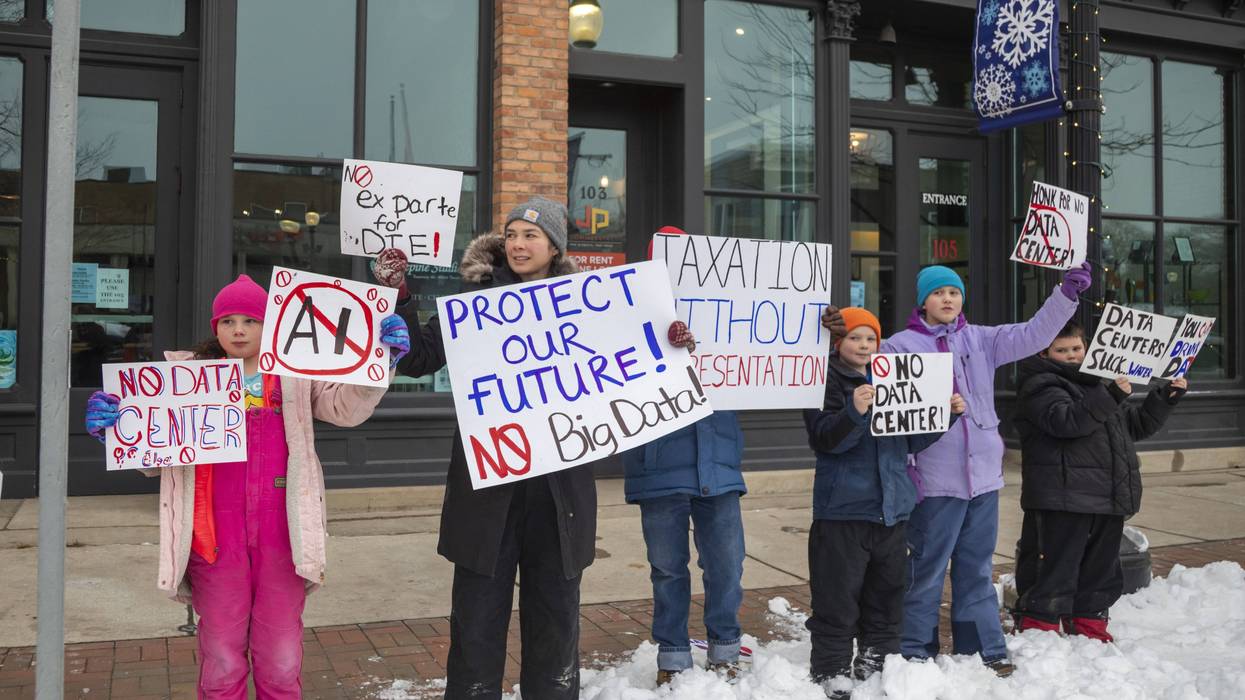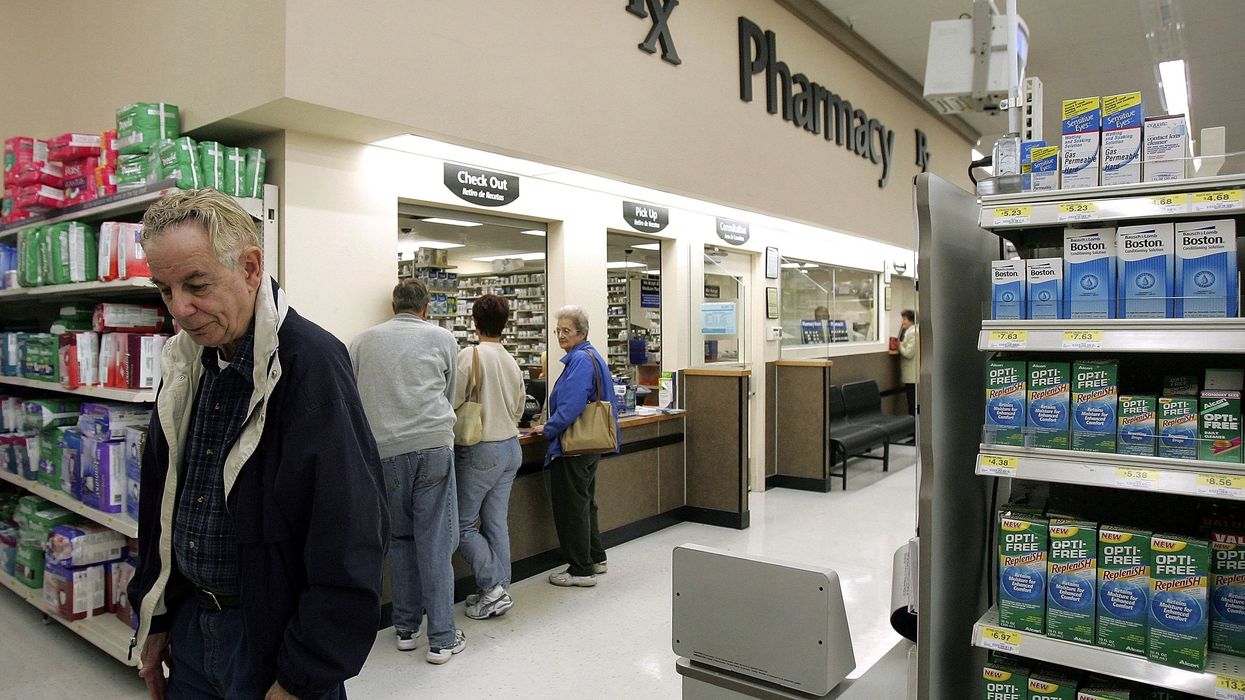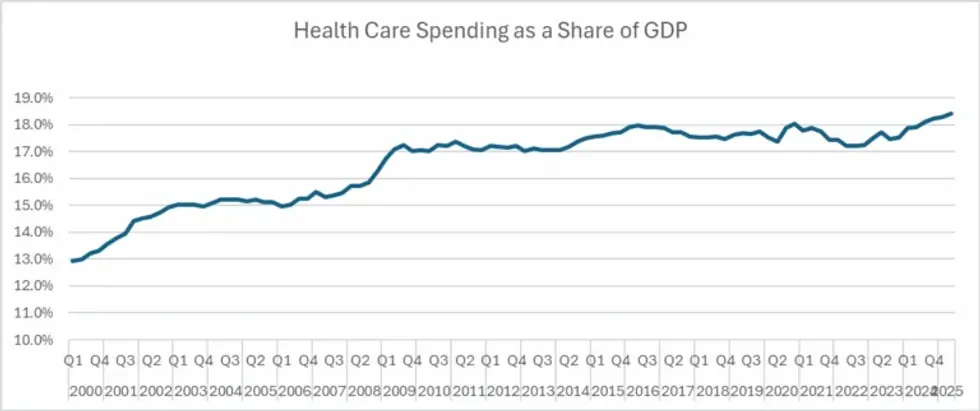Skyrocketing Electricity Bills
Energy-hungry AI systems require immense amounts of computing power. That’s why tech giants like Amazon, Google, Meta, and Microsoft are investing billions of dollars to expedite the construction of massive, primarily gas-powered data centers across the United States. This AI-driven surge in electricity demand, combined with the Trump administration’s ongoing attacks on renewable energy supply and battery storage, is putting increased strain on the power grid. The result? Higher utility bills.
According to a Bloomberg analysis published in 2025, “Wholesale electricity costs as much as 267% more than it did five years ago in areas near data centers. That’s being passed on to customers.” The rapid development of data centers connected to PJM Interconnection—the largest power grid operator in the United States, serving 67 million customers throughout the Midwest and Mid-Atlantic—increased the cost of procuring electricity by $9.3 billion from June 2024 to June 2025, with expenses only expected to rise further.
If this trend continues and data centers become the majority-users of a utility, then utilities may demand even deeper sacrifices from everyday ratepayers to keep their most powerful customers happy.
Residential ratepayers are shouldering this burden unfairly. As the beneficiaries of state-granted monopolies, for-profit utilities are subject to state regulation of prices. Public utility commissioners are supposed to set rates that enable customers to receive affordable power and utilities to cover operating costs and make enough profit to attract investors to fund infrastructure expansions and upgrades. For years, however, increasingly captured commissioners have been approving rate hike requests that pad the pockets of utility executives and shareholders (to the tune of $50 billion per year in excess profit, according to the American Economic Liberties Project).
Now, there’s mounting evidence that state regulators are subsidizing Big Tech’s out-of-control power consumption by forcing customers to fund discounted rates for data centers. This is a boon for investor-owned utilities, which profit from greater energy use. For the rest of us, it makes it harder to scrape by every month. If this trend continues and data centers become the majority-users of a utility, then utilities may demand even deeper sacrifices from everyday ratepayers to keep their most powerful customers happy.
Automated Health Insurance Denials, Home Insurance Rate Hikes
Earlier this month, the US Centers for Medicare and Medicaid Services (CMS) launched the so-called Wasteful and Inappropriate Service Reduction (WISeR) Model. This pilot program allows six companies in six states to use AI to determine whether traditional Medicare enrollees’ requested medical care should be covered.
Reporting on this AI-powered prior authorization program last year, the New York Times noted that “similar algorithms used by insurers have been the subject of several high-profile lawsuits, which have asserted that the technology allowed the companies to swiftly deny large batches of claims and cut patients off from care in rehabilitation facilities.” Firms tapped to manage the WISeR Model “would have a strong financial incentive to deny claims,” the newspaper observed. “Medicare plans to pay them a share of the savings generated from rejections.”
An early warning that CMS Administrator Mehmet Oz is imposing “AI death panels” aimed at preventing seniors from accessing needed healthcare is apt. It’s also worth stressing that Medicare Advantage and private insurance plans have already been using AI-powered prior authorization, with costly and deadly effects for ordinary people.
Property insurers, too, are increasingly relying on AI to project—with zero transparency and questionable accuracy—climate risks, which is contributing to coverage withdrawals and rate hikes in communities around the United States. According to a recent report from McKinsey & Company, the insurance industry’s growing use of AI has led to “a 10 to 15% increase in premium growth.” While industry profits and executive compensation are on the rise, homeowners and renters alike are being hurt by the declining availability and affordability of home insurance. A climate and insurance-driven foreclosure wave, which would starve municipal budgets and could trigger a broader economic crisis, is a real possibility.
Algorithmic Price Gouging
Two shoppers could walk into the same grocery store at the same time and purchase the same product—and yet be charged different prices. This was the conclusion of a recent experiment conducted by Groundwork Collaborative, Consumer Reports, and More Perfect Union. The study, which focused on online grocer Instacart, found that nearly three-quarters of items tested were offered to customers at multiple price points, with an average difference of 13% between the lowest and highest prices.
What the hell are we doing building ruinous housing for super-computers when we could—and should—be building healthy housing (and clean energy and mass transit) for people?
How is this possible? Unfortunately, this increasingly common practice of “surveillance pricing” is the logical outcome of allowing rent-seeking firms to transform our personal data into an asset that can be endlessly mined. AI is turbocharging this phenomenon, from RealPage’s rent-gouging software to Delta Air Line’s use of Fetcherr, an AI-fueled pricing technology.
Negative Environmental and Health Externalities
AI is already wreaking profound havoc on public and environmental health. The rare earth elements used in the microchips that power AI systems tend to be mined in ecologically harmful ways. Data center construction implies habitat destruction, and completed facilities produce significant amounts of toxic electronic waste, which typically contains mercury, lead, and other hazardous materials. Data centers consume tremendous amounts of water, sometimes dispossessing local residents of access in the process. Making matters worse, Big Tech’s quest for cheap electricity is leading it to build data centers in all kinds of places, including drought-stricken states like Arizona and Nevada, compounding preexisting water shortages.
Moreover, most data centers are being powered by planet-heating fossil fuels, especially methane gas. In addition, forecasted AI-related energy shortfalls are leading utilities to keep aging coal plants running and even to revive particularly dirty “peaker” plants, while the use of on-site diesel generators is also growing.
On top of the fact that fossil fuel-powered data centers spew heat-trapping gasses into the atmosphere, research has shown that AI degrades air quality in other ways. Specifically, across its full lifecycle—from chip manufacturing to data center operation—AI contributes to the emission of fine particulate matter or soot, sulfur dioxide, and nitrogen dioxide. These pollutants are linked to numerous adverse health impacts, including lung cancer, asthma, heart attacks, cardiovascular disease, strokes, cognitive decline, and premature mortality. One study estimates that data centers are on track to account for at least 1,300 premature deaths and $20 billion in public health-related costs per year in the United States by 2030. These deleterious consequences are poised to hit already-disadvantaged populations the hardest. That includes the low-income, predominantly Black neighborhoods currently fighting back against Elon Musk’s xAI data centers in South Memphis.
Deferred Green Economic Development Means Climate-flation
What the hell are we doing building ruinous housing for super-computers when we could—and should—be building healthy housing (and clean energy and mass transit) for people? The opportunity costs of supporting Big Tech’s AI data center buildout are striking.
A new analysis from the Rhodium Group estimates that for the first time in two years, US greenhouse gas emissions increased in 2025. The 2.4% uptick in national GHG pollution was driven in large part by data centers and crypto mining. This regressive form of economic development is destabilizing the climate and leaving people less materially secure. It is also being pursued as a reactionary alternative to green economic populism.
It seems clear that a major reason why the ruling class is so heavily invested in AI’s triumph is because they dream of burying organized labor and worker demands once and for all.
Despite recent efforts to decouple climate and affordability, the two issues remain inextricably linked. There’s mounting evidence that climate inaction is exacerbating the cost-of-living crisis. The best way forward is to fight for policies that would simultaneously decarbonize and democratize our society, to confront climate chaos and grotesque inequality at the same time.
Failing to do so, as we are now amid AI-mania, will only lock-in more fossil fuel pollution, thus aggravating extreme weather and with it, supply chain disruptions and price shocks. Current and future generations will be forced to endure a more brutish and expensive world full of economic insecurity and uneven, but rampant, suffering.
Endgame: Wage Repression, Tyranny, and Unlimited Rent Seeking
Some AI-related costs have not yet been realized. But if Silicon Valley oligarchs succeed in empowering firms all across the economy to eliminate jobs (and deskill further pockets of the workforce), skyrocketing unemployment would empower bosses to suppress wages. It seems clear that a major reason why the ruling class is so heavily invested in AI’s triumph is because they dream of burying organized labor and worker demands once and for all. Meanwhile, the collision of declining pay and rising prices would push more and more people closer to the brink.
How are people supposed to enjoy the leisure time ostensibly provided by AI advancements if they can’t afford basic necessities? Is rapid access to information a net-positive no matter the quality of that information? Isn’t it more likely that society’s capacity for critical thinking will be further degraded? And if we deprive the next generation of literacy while immersing them in a poisoned information ecosystem, doesn’t that increase the likelihood that authoritarian demagogues will retain power?
That’s why billionaire techno-fascists are trying so hard to imprison us within their AI-dominated world. Whether by preempting regulation of AI inside existing borders or violently establishing new, regulation-free jurisdictions where they can impose their will, a tiny class of digital overlords and their political allies are seeking to end democracy so they can extract rents with no constraints. We can’t afford to let their dystopian vision become reality.





